Mass Effect Andromeda Review: A Fun (But Safe) New Frontier
Mass Effect: Andromeda isn’t the most innovative game out there, but it’s easy to get lost in this imaginative space opera.
Why you can trust Tom's Guide
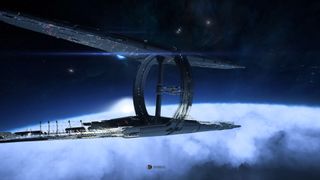
Five years have come and gone since the last Mass Effect game, and open-world role-playing games have come a long way since then. The Witcher 3 broke new ground in narrative choices and repercussions; Final Fantasy XV merged Eastern and Western design philosophies; BioWare’s own Dragon Age: Inquisition perfected party members whose opinions of you change dramatically over time.
What does Mass Effect: Andromeda ($60; PC, PS4, Xbox One) add to the RPG tradition? Aside from a brand-new story in the Mass Effect setting and a little light platforming, not a whole lot. The combat is still a little clunky, the conversations are still a little static, and the pacing is still uneven. On the other hand, the characters are still fascinating, the story is still full of interesting choices, and the setting is still just the right balance between hard sci-fi and space fantasy. Mass Effect: Andromeda isn’t the most innovative or technically impressive game you can buy, but if you want to lose yourself in an imaginative space opera for the next 40 hours or so, this series is still the best way to do it.

Gameplay: Galaxy Quest
Describing every single thing you can do in Mass Effect: Andromeda would take a whole review; suffice to say, it’s an open-world game with lots of planets to explore, and lots of things to do on each world. Cast as one of the Ryder siblings, you’ll trade fire with a variety of hostile aliens, drive a rover around big, explorable areas, build up your relationships with your party, make tough calls that affect the direction of the story and fly your ship, the Tempest, all around a small cluster of the Andromeda galaxy.
One thing that Mass Effect: Andromeda does better than almost any other game on the market right now is customization. You can shape not only how you want Ryder to look, but customize her sibling as well. (If you play as a female Ryder, her brother will still play a supporting role in the game, and vice versa). Your appearances will affect how your father, Alec, looks.
MORE: Best Gaming Headsets
The only problem is that customization is not quite as robust as it used to be. Ryder doesn’t have quite as many facial options as did Commander Shepard in the previous trilogy, nor as many options as the Herald in BioWare’s other big recent-ish RPG, Dragon Age: Inquisition. You can still make some pretty wonderful (or bizarre) protagonists, but it’s not clear why BioWare would take away options from the player rather than add.
Customization doesn’t end with character faces and skin tones, either. You can equip a ton of different weapons and armors, color your casual outfits, paint your vehicle, choose your romantic partner, complete (most) quests in almost any order, and choose your style of dialogue in almost every conversation. By the end of the game, your Ryder will feel uniquely yours — and no other player will have quite the same relationship with her squad, or to the galaxy overall.

Story: Somewhere That’s Green
After 600 years, the Hyperion has arrived in the Andromeda galaxy, bringing 20,000 human colonists — and the eager Ryder siblings — with it. Along with fellow Milky Way races — turians, asari, salarians and krogan — humanity was supposed to settle on seven habitable “Golden Worlds” and begin exploring a whole new frontier.
Things haven’t worked out as planned. The Golden Worlds are barely habitable wrecks; a spatial anomaly known as the Scourge nearly knocks the Hyperion out of the sky; the Nexus, which directs the Andromeda mission, is a half-functional mess; and an alien race known as the kett will stop at nothing to destroy the Milky Way transplants. Now, it’s up to Ryder and her crack team of experts to investigate the Golden Worlds, solve their ancient mysteries and discover just what the kett are after.
Right off the bat, Andromeda earns a lot of credit for putting an imaginative sci-fi story front and center. Exploring a whole new galaxy is a brilliant concept, and builds up enough distance to make the events of the previous Mass Effect games almost ancillary. The fully realized setting is still intact, complete with its affable aliens and interstellar technology, but Andromeda demonstrates that there is still very much room for Mass Effect without Commander Shepard.
On the other hand, it’s precisely because of the potential richness of the setting that what we get doesn’t feel as impressive as it could have been. Explorers arrive in a whole new galaxy — 2.5 million light years away, remember — and what do we find? Bipedal aliens who use projectile-based weaponry in order to make war and subjugate other races, just like in the previous games.
Even more familiar, the kett are in the process of hunting down and unearthing tech from an ancient race of robotic beings known as the remnant. It’s not exactly the same as the setup for the original Mass Effect, but there are a lot of parallels between the kett/remnant and the geth/Reapers. Furthermore, while a passable villain does eventually show up, he takes his sweet time, leaving the plot feeling somewhat directionless for more than a dozen hours.
At least you’ll have some good company while you travel. Your companions are up to usual BioWare standards, from the krogan veteran Drack to the impatient asari PeeBee. (The humans, Liam and Cora, are probably the most boring of the bunch, but even that is something of a BioWare tradition at this point.) Each character has his or her own distinct personality, combat style and quest chain, and each one is worth spending some time with. And yes, you can sleep with pretty much any of them.
The story, setting and characters in Mass Effect: Andromeda are, overall, what makes the game worth playing. They could have been even more memorable, though.
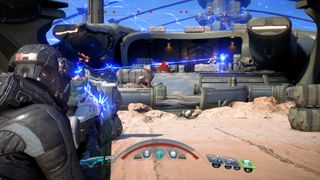
Combat: Now With Jetpacks
Exploration and conversation are only two pillars of the Mass Effect tripod; the third is combat. Despite the welcome addition of two big advancements — jump jets and a quick dodge — duking it out with enemies on the ground is still pretty much the same as it was before. Choose your weapon (pistol, sniper rifle, shotgun, assault rifle — although you have some more melee options this time around), load up a few special skills, then trade fire with enemies as you both hide behind cover, waiting for shields and health to regenerate.
Like previous Mass Effect games, the combat in Andromeda is a little clunky, but it works. The jump and dodge abilities add some welcome verticality to combat. Hovering over an enemy while you land headshots is as satisfying as it sounds. But even on Normal difficulty, you can’t take that many hits, so jumping around the battlefield and hovering in open areas is usually a recipe for disaster.
The movement skills don’t change Mass Effect combat so much as just streamline it. Some fights are exciting; most are there to just pass the time.
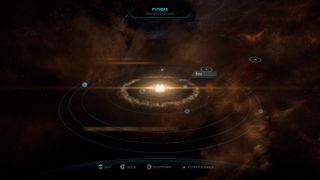
Progression: Decisions, Decisions
If you’ve played an RPG sometime between the first edition of Dungeons & Dragons and today, you know the deal with Andromeda: gain experience points, level up, and choose your skills.
Unlike previous Mass Effect titles, Ryder’s class is not set in stone. You can level up combat, tech, and biotics (think Jedi powers), regardless of your starting skills. As you level up in multiple trees, you can combine skills into distinct Profiles, and even swap out Profiles between missions. It’s not a big deal at first, but later on in the game, Ryder can become extremely versatile, with various profiles suited to different types of missions and party compositions.
You’ll also be in charge of improving each planet’s viability for colonization. By completing tasks — something as simple as calling down a forward station, or something as complicated as unearthing and exploring an ancient alien vault — you can improve planetary viability and unlock perks, like extra income or more resources for crafting items. It’s a complicated system, but it does give Ryder plenty to do on each world.
I have only one major complaint about the open-world progression, and it can be summed up with a single word: Nomad. Planets are too big (and too hostile) to traverse on foot, so you’ll hop into a six-wheeled tank called the Nomad that can transport you from point A to point B. Sounds good, in theory, but it’s actually a step backward from the similar Mako all the way back in the first Mass Effect.
The Nomad is a beast to control, getting stuck on terrain and struggling with hills like a Yugo with a busted cylinder. Piddling jump and boost abilities do little to alleviate the tedium of driving around in the Nomad; even running enemies down is no fun, as its shields exhaust themselves almost instantaneously, and it has no offensive weaponry. Unlocking fast travel points feels like a relief rather than a reward, just so you can spend less time in the Nomad.
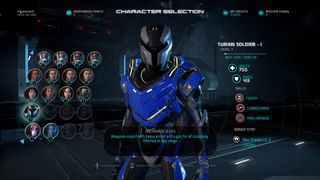
Multiplayer: Welcome to the Grind
Multiplayer is a relatively new addition to the Mass Effect canon, having debuted only in Mass Effect 3. Like its predecessor, multiplayer missions in Andromeda bolster the single-player as well, making it worth playing even if you usually abhor teaming up with other players. It’s nothing groundbreaking, but it’s a fun way to pass a few hours, especially if you can play with friends rather than strangers.
The formula hasn’t changed much since Mass Effect 3. You and three other players team up to take on wave after wave of increasingly difficult enemies across a variety of maps. You can unlock different races, classes, weapons and perks as you gain experience and currency. The most successful teams are generally those that coordinate their strategies and choose a good mix of classes with access to combat, tech and biotic skills.
I imagine that Mass Effect: Andromeda will have a healthy multiplayer community for some time to come, if only because players will want to unlock the best perks possible for the single-player (although this time around, you can actually dispatch non-player squads to complete multiplayer missions, provided you’re willing to wait real-time for them to complete. It’s a nice compromise for players who have no interest in playing online). There are plenty of classes and gear to unlock, and you can even get minor upgrades like better shields or more health if you play a single class for an inordinate amount of time.
The only problem is that player level makes a huge deal — arguably even more so than skill. Each tier of the multiplayer (Bronze, Silver, Gold) is designed with a certain level range in mind, between 1 and 20. Since you unlock better skills as you progress, a team of Level 1 characters will have a tough time, even in Bronze, while a single Level 1 player among a group of more experienced ones can’t contribute nearly as much.
During my time with the multiplayer, I also found that trying to complete missions without a full four-person squad was a waste of time. There don’t appear to be any concessions for smaller parties, which is a shame if you can’t get a full group together, for whatever reason.
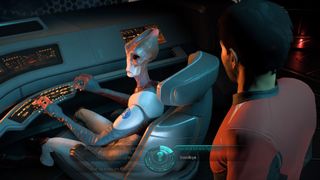
Graphics and Sound: Stuck in Cryo
If Mass Effect: Andromeda has one weak point, it’s the way it looks. While the particle effects and environments look much richer than their last-gen predecessors, the character models and facial expressions are still very much stuck in suspended animation. Characters occupy an unpleasant area in the Uncanny Valley; lifelike enough to look realistic, but inorganic enough to take you out of the experience. Their movements seem exaggerated and unnatural.
Worse still, conversations — of which the game has a lot — are still just two characters standing still, exchanging mountains of exposition for up to five minutes at a time. This criticism isn’t unique to Mass Effect, but RPGs have got to figure out a more engaging way to impart important storytelling and world-building information, because this approach has been done to death.
At least the music and voice acting are up to BioWare’s usual high standards. The music is a subtle mix of techno and more traditional orchestral fare, while the voice actors imbue each character with genuine emotion. Each one of the party members delivers some memorable lines, but I have to give credit to Fryda Wolff (Poison Ivy, DC Super Friends) and Tom Taylorson (Octodad, Octodad: Dadliest Catch), who play the Ryder siblings. They have a ton of lines to deliver in a variety of possible tones, and manage to convey everything from rationality to humor to pathos in their performances.
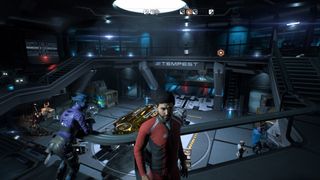
Bottom Line: A Rocky Path(finder)
Mass Effect: Andromeda is a different kind of adventure in the Mass Effect setting. It isn’t kicking off an epic trilogy about saving the galaxy; it’s about exploration and finding a new home in a hostile environment. The heroes are proactive for a cause, rather than reactive to a powerful villain. Commander Shepard’s story is done, and as it turns out, that’s just fine. The series can go on without him easily.
However, given the game’s incredible potential, Mass Effect: Andromeda isn’t all it could have been. The story feels familiar, even in the far-flung setting, and the combat still occupies an imperfect middle-ground between a third-person shooter and a more traditional RPG. The graphics would have looked right at home on Xbox 360 or PS3.
And yet, when the game hits its stride, it can be tremendous fun to play. Seeing a planet change from an uninhabitable rock into a thriving civilization is just as satisfying as it sounds, and turning your team from a ragtag group of galactic misfits into a tight-knit collection of friends is a rewarding experience. Customizing your perfect (or imperfect, but lovable) Ryder is just as open-ended and intricate as it should be.
Mass Effect: Andromeda is a good game that’s right on the cusp of being a great one. For longtime series fans — as well as newcomers looking for a big, bold sci-fi adventure — it’s an easy recommendation. You’ll have to put up with some unnecessary frustrations along the way, but hasn’t that always been true for history’s great explorers?
Sign up to get the BEST of Tom’s Guide direct to your inbox.
Upgrade your life with a daily dose of the biggest tech news, lifestyle hacks and our curated analysis. Be the first to know about cutting-edge gadgets and the hottest deals.
Marshall Honorof is a senior editor for Tom's Guide, overseeing the site's coverage of gaming hardware and software. He comes from a science writing background, having studied paleomammalogy, biological anthropology, and the history of science and technology. After hours, you can find him practicing taekwondo or doing deep dives on classic sci-fi.

